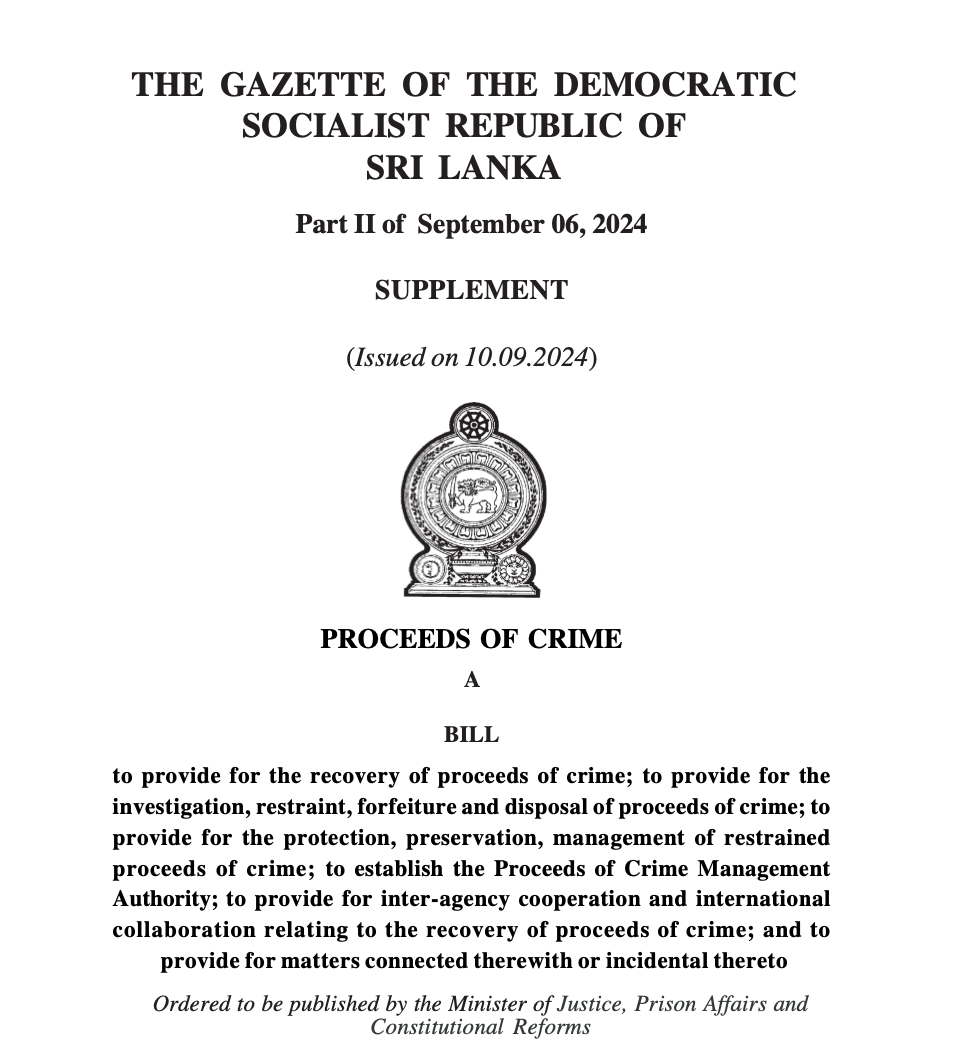New Bill to provide for the recovery of proceeds of crime; to provide for the investigation, restraint, forfeiture and disposal of proceeds of crime; to provide for the protection, preservation, management of restrained proceeds of crime; to establish the Proceeds of Crime Management Authority; to provide for inter-agency cooperation and international collaboration relating to the recovery of proceeds of crime; and to
provide for matters connected therewith or incidental thereto
Salient Points
- Recovery and Management: The bill provides mechanisms for the investigation, restraint, forfeiture, and disposal of the proceeds of crime. It also establishes the Proceeds of Crime Management Authority to oversee these processes.
- Inter-agency and International Cooperation: It facilitates cooperation between domestic law enforcement agencies and administrative authorities, as well as international collaboration in tracking and recovering proceeds of crime.
- Protection and Management: Provisions are included for the protection, preservation, and management of restrained assets until a final judicial decision is made.
- Scope of Application: The bill applies to crimes committed both within and outside Sri Lanka, especially when they involve Sri Lankan citizens, public property, or have an impact on the country’s interests.
- Offences and Penalties: The bill defines various offences, including concealing proceeds of crime, failing to disclose knowledge of such proceeds, and obstructing investigations. Penalties include fines and imprisonment.
- Judicial and Administrative Powers: The bill grants powers to the High Court and other designated authorities to issue freezing, seizure, and forfeiture orders.
- Protection for Whistleblowers: It includes protections for informants and whistleblowers, ensuring their identities remain confidential and safeguarding them from retaliation.
- Restitution and Repatriation: It provides a legislative mechanism for restitution and repatriation to victims of crime, establishing a Victims of Crime Reparation Trust Fund.
- Compatibility with International Standards: The bill aligns with international conventions against corruption, organized crime, and the illicit drug trade, integrating global best practices.
The penalties for violations under the proposed Proceeds of Crime Bill are as follows:
- Concealment or Disguising of Proceeds: Individuals found guilty of concealing, disguising, or otherwise dealing with the proceeds of crime can face:
- A fine not exceeding 10 million rupees.
- Imprisonment for a period of up to 15 years.
- Acquisition or Possession of Proceeds: Acquiring, possessing, or using proceeds of crime is an offence punishable by:
- A fine not exceeding 10 million rupees.
- Imprisonment for up to 15 years.
- Destruction of Evidence: Destroying evidence related to proceeds of crime carries:
- A fine not exceeding 10 million rupees.
- Imprisonment for up to 15 years.
- Breach of Orders: Obstructing enforcement of court orders (like freezing, seizure, or restraining orders) or notices from law enforcement results in:
- A fine not exceeding 10 million rupees.
- Imprisonment for up to 15 years.
- False Responses or Claims: Providing false information, misleading claims, or attempting to obstruct investigations can lead to:
- A fine not exceeding 10 million rupees.
- Imprisonment for up to 15 years.
- Failure to Disclose Knowledge: Not reporting known information about proceeds of crime to authorities may result in:
- Imprisonment for a period not exceeding 5 years.
- A fine not exceeding 1 million rupees.
- Dissuading Disclosure: Preventing others from disclosing information regarding proceeds of crime or interfering with authorized officials is punishable by:
- Imprisonment for up to 5 years.
- A fine not exceeding 1 million rupees.
- Corporate Offences: Directors or office bearers of a company or partnership involved in violations can be held individually liable and face similar fines and imprisonment terms.
- Offences by Incorporated Bodies: If an offence is committed by an incorporated or unincorporated body, the respective directors or office bearers can face:
- Individual liability for the offence.
- The same penalties as outlined above (fines and imprisonment).
All offences under the Act are cognizable, meaning the authorities can arrest without a warrant and prosecute offenders in a court of law.
http://documents.gov.lk/files/bill/2024/9/565-2024_E.pdf
https://www.parliament.lk/uploads/bills/gbills/english/6378.pdf














